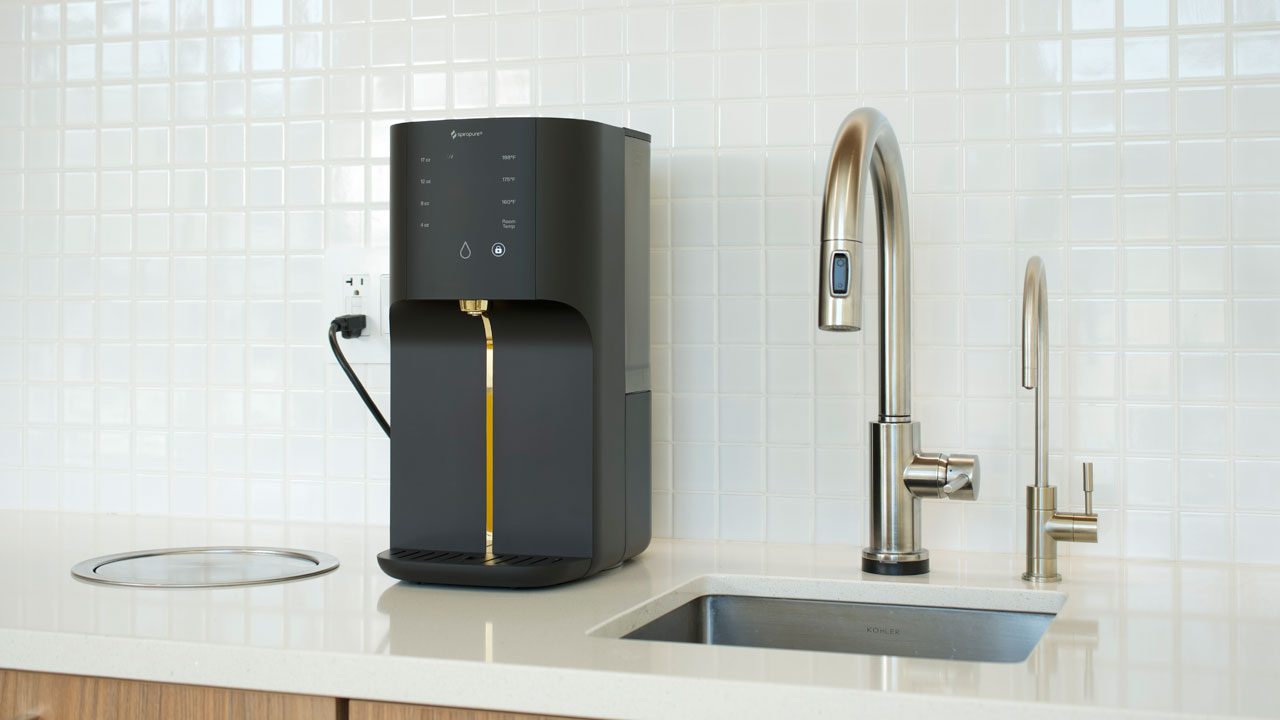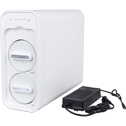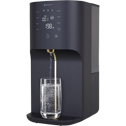The Best Water Filters That Remove Fluoride (And Why You Need One)
 Andrew
November 26, 2025
#fluoride
#reverseosmosis
Andrew
November 26, 2025
#fluoride
#reverseosmosis

- Reverse osmosis (RO) systems are the most effective filters for removing fluoride, consistently reducing levels to well below safety limits by forcing water through semi-permeable membranes with 0.0001-micron pores
- Multi-stage filtration enhances fluoride removal through pre-filters that protect the RO membrane and post-filters that remineralize water for better taste and health benefits
- Countertop, tankless, and traditional tank RO systems all remove 85-95% of fluoride, with options available to fit different space requirements and household water demands
- Standard carbon, ceramic filters, and even boiling water cannot remove fluoride, making RO technology essential for homeowners specifically concerned about fluoride reduction
Fluoride is a naturally occurring mineral that can be found in soil, rocks, and groundwater. For many years, it has safeguarded the dental health of Americans by lowering cavities, tooth decay, and dental health inequalities. According to the CDC, 72.3% of the U.S. population, about 209 million people, receive their drinking water from fluoridated systems.
In 1945, fluoride was introduced into public water systems to prevent tooth decay by fortifying the outermost layer of tooth enamel. However, as scientific studies gain increasing public attention, many people are starting to question the presence of fluoride in their tap water and whether water filters can effectively remove it.
Concerns range from minor changes in enamel to more serious conditions like skeletal fluorosis and neurodevelopmental effects. While there are specialized filters made of unique media such as activated alumina or bone char, in this article, we'll take a closer look at home RO water filters that remove fluoride, how they work, and which options may be best for your home. (Read more: Is Fluoride in Water Good or Bad? Understanding Your Options.)
RO Filters Remove Fluoride
A comparative study was conducted to identify which types of water filters are most effective at reducing fluoride in drinking water. The researchers found that reverse osmosis (RO) water filters were the most effective, consistently reducing fluoride levels to well below recommended safety limits. This makes them a reliable choice for people concerned about fluoride in their drinking water.
How Do RO Water Filters Remove Fluoride?
By forcing water through a semi-permeable membrane, RO water filters work by only allowing water molecules to go through. Fluoride becomes stuck in the filtration process because its particles are larger than water molecules. Reverse osmosis is one of the few filtration methods capable of removing fluoride, and many people choose these systems specifically for this reason.
Is It Possible to Remove 100% Fluoride?
Technically, it's almost impossible to eliminate fluoride from water. Under optimal circumstances, even the most effective techniques cannot eliminate every trace of fluoride. If you're looking for water filters that can almost entirely remove fluoride, multi-stage systems with core RO elements are the most effective solution.

Countertop and Booster Pump RO Systems
The SpiroPure SP-RO500 is a water filter that reduces fluoride and is easy to set up, plus it replenishes essential minerals in the remineralization stage. This home water filter is an RO system, so it removes 85–95% of fluoride in residential systems and filters water down to the equivalent of around 0.0001 microns.
Because the SP-RO500 has a relative pore size of 0.0001 microns (0.1 nanometers), this water filter effectively removes fluoride, as the size of a fluoride ion is 0.133 nanometers. Water passes through easily, but the membrane blocks most of the fluoride, typically reducing levels significantly, resulting in cleaner, safer drinking water.
Filter Stages That Enhance Filtration
The pre-filters in the SP-RO500 include a sediment and a carbon filter, as well as the polypropylene pad. These stages further improve fluoride reduction by preserving the RO membrane from sediment, chlorine, and other contaminants. The post-filters include the combined MineralPlus and post-carbon stage, which enhances system efficiency, while the UV layer provides an additional layer of disinfection filtration.
Tankless RO Systems
The SpiroPure SP-RO1000TL is a tankless RO water filter that removes fluoride. It's made to fit under your sink, taking up less space, and it includes all the parts you need to install it. This system utilizes an RO membrane that has a capacity of 1000 gallons per day (gpd). It has an extremely high throughput, which allows it to manage larger water volumes, and the core RO membrane is effective at removing small ions like fluoride.
Additional Stages That Help Reduce Fluoride
This home water filter that removes fluoride is particularly effective because it also has pre- and post-filters separately housed within the same cartridge. The pre-filters include the polypropylene sediment and carbon block filters, which don't remove fluoride directly but rather protect the RO membrane and improve its efficiency by shielding it from clogging, damage, and chemical interference.
The two post-filters of this water filter include the polishing and remineralization stages, which don't directly remove fluoride. However, they enhance its reduction by removing residual contaminants to offer improved taste and water alkalinity.

Traditional Tank RO Systems
The SpiroPure SP-RO100MP is an under-sink filter that has six filtration stages with remineralization. Stage four of this system has an RO membrane that targets dissolved materials at the ionic level, including fluoride ions. The radius of a fluoride ion is about 0.133 nanometers, and the pore diameter in the RO membrane is about 0.1 nanometers, so the pores in the membrane are small enough to filter out fluoride.
Stages That Support Fluoride Reduction
The SpiroPure SP-RO100MP water filter removes fluoride effectively, especially when supported by the other five filtration stages. Stages one to three of this home water filter don't remove fluoride directly, but they make the RO membrane more effective at rejecting it. The sediment filter eliminates dirt and rust, the GAC filter lowers chlorine, and the carbon block eliminates chemicals, allowing the RO membrane to function optimally.
Stages five and six are post-filtration stages that improve water quality. The MineralPlus beads in stage five maintain pH and replenish essential minerals. The carbon media in stage six is a final "polish" that removes residual bad tastes from the filtration process.
Conclusion
One of the best ways to significantly reduce fluoride levels in drinking water is to use RO systems with multi-stage filtration. By using a high-performance RO membrane with pre-filters and post-filters that protect the membrane and remineralize water, these systems remove almost all the fluoride in drinking water. Place an order today and enjoy an effective home water filter that removes fluoride.
Why do people want to remove fluoride from their drinking water?
Although fluoride helps prevent cavities, prolonged exposure to high levels has been linked to health issues such as dental and skeletal fluorosis. For this reason, many people are looking for solutions such as water filters that remove fluoride.
Will boiling water remove fluoride?
No. Boiling water won't eliminate fluoride. In contrast, a higher concentration happens if water is boiled, as the water evaporates into steam, leaving behind fluoride and other minerals in a smaller amount of water.
Do reverse osmosis (RO) filters remove fluoride?
Yes. One of the best ways to eliminate fluoride from drinking water is to use an RO filter. They work by forcing water through a semi-permeable membrane with microscopic pores that are the equivalent of 0.0001 microns in size. This is small enough to obstruct fluoride ions, which have a larger diameter than water molecules.
Do RO water filters remove fluoride more effectively than other filters?
Yes. Reverse osmosis filters are more effective at removing fluoride than most other types of filters. In comparison, other products like standard carbon or ceramic filters are not designed to target fluoride and have little to no effect.
Is it safe to drink RO water every day?
Yes. It's safe to drink RO water daily, particularly if the system has remineralization, which restores healthy minerals and balances pH.
Where can I buy water filters that remove fluoride?
All Filters offers a wide range of efficient RO systems, including high-quality SpiroPure products at affordable prices. You'll find comprehensive product details, replacement parts, and customer service to help you choose the ideal system for your home.
What other traditional tank RO systems are available at All Filters?
The SpiroPure SP-RO100MP-BK, SP-RO100MP-CM, SP-RO100MP-GD, and SP-RO100MP-NK are other effective home water filters that come with faucets with air gaps that remove fluoride.






